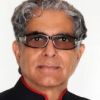7 Complexity Theory Books That Separate Experts from Amateurs
Recommended by Deepak Chopra, Bill Gurley, and Stuart Kauffman, these Complexity Theory books offer proven insights and frameworks.


What if the secrets behind the world's most complex systems could be unlocked through a handful of insightful books? Complexity Theory isn't just abstract math; it shapes everything from ecosystems to human consciousness. Deepak Chopra calls "Notes on Complexity" a transformative read that changed his perspective on reality itself. Meanwhile, Bill Gurley highlights "Complexity" by M. Mitchell Waldrop for its profound impact on understanding nonlinear systems. These recommendations come from experts whose work spans consciousness, investment, and science, bridging diverse fields through complexity.
Stuart Kauffman, a MacArthur Fellow, praises works that reveal the interconnectedness of life and emergent phenomena, while Jon Kleinberg and Scott Aaronson offer fresh takes on computational challenges that lie at the heart of complexity theory. Their endorsements speak volumes: these books don't just teach theory—they change how you think.
While these expert-curated books provide proven frameworks, readers seeking content tailored to their specific background, skill level, and learning goals might consider creating a personalized Complexity Theory book that builds on these insights, delivering customized knowledge to accelerate your journey.
Recommended by Deepak Chopra
Author and expert on consciousness
“This is an extraordinary book that will change the way you understand yourself and the universe. It will empower you. We should all be indebted to Neil Theise for this monumental contribution to the science behind all reality.” (from Amazon)
by Neil Theise··You?
Unlike most complexity theory books that focus narrowly on abstract models, Neil Theise blends his expertise as a pathology professor and Zen Buddhism practitioner to explore how complex systems shape consciousness and existence. You’ll find detailed discussions on life’s interconnectedness, from cellular structures to ecosystems, supported by examples such as the anatomy of the human interstitium. This book invites you to reconsider your place in a dynamic, evolving universe, making it especially insightful for those curious about science, philosophy, and metaphysics. It’s a thoughtful read for anyone ready to move beyond reductionist views and embrace complexity’s broader implications.
Recommended by Bill Gurley
General Partner at Benchmark
“This is such a great point. This is the essence of Complexity Theory. With complex systems (multi-variable, nonlinear), you have no idea if the variable you are using for analysis will hold over the long term. Read this book, it changes everything -” (from X)
by M. Mitchell Waldrop··You?
by M. Mitchell Waldrop··You?
M. Mitchell Waldrop, with a doctorate in elementary particle physics and extensive experience at Science magazine, explores how countless elements within complex systems interact to create spontaneous order from chaos. You’ll uncover how interdisciplinary insights from physics, biology, and economics challenge traditional scientific views and reveal the unpredictable beauty of complexity. The book unpacks the dynamics behind emergent behavior, making it ideal if you want to grasp the underlying principles that govern complex adaptive systems. Chapters detail both pioneering thinkers and their groundbreaking models, helping you appreciate the evolving science behind complexity and its implications.
by TailoredRead AI·
This tailored book explores complexity theory in a way that aligns precisely with your expertise and learning objectives. It covers foundational principles, emergent behaviors, computational challenges, and systems dynamics, all synthesized to match your background and interests. By focusing on your chosen sub-topics, it reveals how complexity shapes diverse fields, from computer science to natural phenomena. This personalized approach ensures you engage deeply with the material most relevant to your goals, avoiding unnecessary breadth while highlighting critical concepts. The text invites you to navigate complex ideas with clarity, supported by examples and explanations crafted specifically for your knowledge level and ambitions.
Recommended by Jon Kleinberg
Cornell University professor and complexity theorist
“A creative, insightful, and accessible introduction to the theory of computing, written with a keen eye toward the frontiers of the field and a vivid enthusiasm for the subject matter.” (from Amazon)
by Cristopher Moore, Stephan Mertens··You?
by Cristopher Moore, Stephan Mertens··You?
What happens when two experts in theoretical computer science set out to demystify complexity theory? Cristopher Moore and Stephan Mertens offer a clear, engaging exploration of computational complexity that strips away unnecessary formalism to reveal the core ideas beneath. You'll learn why P vs. NP remains a central puzzle, how complexity intersects with physics and biology, and the significance of concepts like interactive proofs and quantum computing. The book balances rigor with accessibility, making it a fit for both computer scientists seeking deeper insight and non-specialists curious about the subject. Expect lucid explanations paired with real examples, especially in chapters on randomized algorithms and phase transitions.
Recommended by Avi Wigderson
Professor, Institute for Advanced Study, Princeton
“Computational complexity theory is at the core of theoretical computer science research. This book contains essentially all of the (many) exciting developments of the last two decades, with high level intuition and detailed technical proofs. It is a must for everyone interested in this field.” (from Amazon)
by Sanjeev Arora, Boaz Barak··You?
by Sanjeev Arora, Boaz Barak··You?
Sanjeev Arora, a Princeton computer science professor with a Ph.D. from Berkeley, co-authored this rigorous graduate textbook to map out both classical and recent advances in computational complexity theory. It demands mathematical maturity but no more, making it accessible to mathematicians, physicists, and scientists venturing into complexity. You’ll explore foundational concepts like NP-completeness alongside emerging topics such as quantum computation and hardness of approximation, supported by over 300 exercises with hints. Whether you’re aiming to deepen theoretical understanding or need a dependable reference for courses and research, this book offers a balanced blend of intuition and detailed proofs tailored to a broad scientific audience.
by Daniel P. Bovet, Pierluigi Crescenzi··You?
by Daniel P. Bovet, Pierluigi Crescenzi··You?
The authoritative expertise behind this book is clear from Daniel P. Bovet's distinguished career in computational complexity theory and algorithm design. Drawing on a balanced mix of algorithmic and structuralist perspectives, the book guides you through fundamental complexity classes, their relationships, and structural properties influencing computational difficulty. You’ll engage with over 120 worked examples and a wealth of problems and illustrations, making abstract concepts tangible. This text suits those diving deep into complexity and computability, algorithm design, or combinational mathematics, providing a rigorous foundation rather than casual overview.
by TailoredRead AI·
This tailored book explores the rapid transformation of complexity theory by focusing on your unique interests and background. It covers foundational principles and advanced topics, guiding you through the intricate relationships and emergent behaviors that define complex systems. By matching your specific goals, it reveals how to navigate the challenges of nonlinear dynamics, computational complexity, and system adaptation with clarity and precision. This personalized approach synthesizes broad expert knowledge into a custom pathway, helping you grasp complex concepts efficiently and build a deep understanding tailored to your learning journey.
by Ingo Wegener, R. Pruim··You?
by Ingo Wegener, R. Pruim··You?
Ingo Wegener's decades of research in algorithmic complexity culminate in this insightful exploration of complexity theory's core principles and limits. You’ll find a detailed examination of how computational resources dictate algorithm feasibility, with particular emphasis on randomization and NP-completeness. The book bridges abstract theoretical concepts with practical implications across computer science, making it especially useful if you’re aiming to grasp why certain efficient algorithms are unattainable. Its chapters delve into evolving branches of complexity theory, illustrating how these ideas influence modern computing challenges, which benefits students, researchers, and practitioners seeking a grounded understanding of algorithmic boundaries.
by Edgar Morin, Alfonso Montuori··You?
by Edgar Morin, Alfonso Montuori··You?
Edgar Morin, a renowned French thinker, developed this collection of essays to unpack the technical and philosophical foundations of complexity theory, applying them to diverse challenges in our interconnected world. You'll explore concepts like self-organization, epistemological openness, and the paradoxes of order and disorder, gaining insight into how classical science's limitations have shaped current understanding. The book delves into systemic thinking and the necessity for macro-concepts, offering a nuanced framework that benefits anyone grappling with complex systems in fields ranging from social sciences to organizational strategy. While dense, the essays provoke deeper reflection on how to live and act within complexity rather than providing quick fixes.
Get Your Personal Complexity Theory Guide ✨
Stop sifting through endless books. Get targeted strategies that fit your goals and background.
Trusted by complexity enthusiasts and professionals worldwide
Conclusion
Together, these seven books reveal complexity theory from multiple angles—scientific, computational, philosophical, and practical. If you're fascinated by how systems self-organize and evolve, start with "Notes on Complexity" and "On Complexity" for broader perspective. For a deep dive into algorithms and computational limits, "Computational Complexity" and "The Nature of Computation" provide technical rigor.
Facing real-world problems in algorithm design or system modeling? Combining "Complexity Theory" by Ingo Wegener with foundational texts like "Introduction to the Theory of Complexity" can sharpen your applied skills quickly. Alternatively, you can create a personalized Complexity Theory book to bridge the gap between general principles and your specific situation.
These books can help you accelerate your learning journey, whether you’re a student, researcher, or practitioner. They’re not just academic treatises—they’re guides to engaging with the complexity around us in smarter, more insightful ways.
Frequently Asked Questions
I'm overwhelmed by choice – which book should I start with?
Start with "Notes on Complexity" for a broad, interdisciplinary view that connects science and philosophy, then explore more technical works like "Computational Complexity" to deepen your understanding.
Are these books too advanced for someone new to Complexity Theory?
Some books like "Introduction to the Theory of Complexity" offer foundational knowledge accessible to newcomers, while others are more technical. Choose based on your comfort with math and theory.
What's the best order to read these books?
Begin with broader perspectives such as "Complexity" and "Notes on Complexity," then move toward computational and algorithmic texts like "The Nature of Computation" and "Computational Complexity" for technical depth.
Do I really need to read all of these, or can I just pick one?
Each book offers unique insights. Picking one depends on your focus—philosophical, computational, or applied. For a rounded grasp, reading multiple is beneficial but not mandatory.
Which books focus more on theory vs. practical application?
"Computational Complexity" and "The Nature of Computation" emphasize theoretical foundations, while "Complexity Theory" by Wegener bridges theory with algorithmic applications.
Can I get personalized insights instead of reading multiple books?
Yes! While expert books provide broad knowledge, personalized Complexity Theory books tailor content to your goals and background, complementing expert insights perfectly. Learn more here.
📚 Love this book list?
Help fellow book lovers discover great books, share this curated list with others!
Related Articles You May Like
Explore more curated book recommendations






